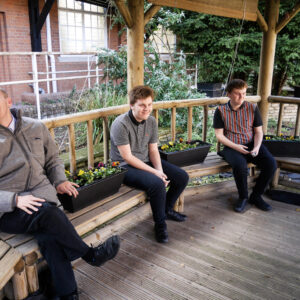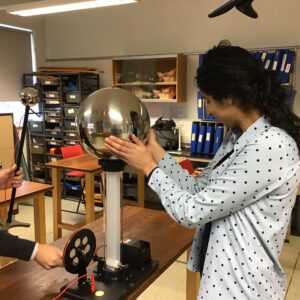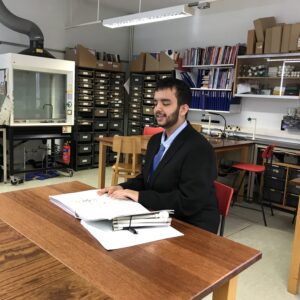Written by Will Stark, Head of Science.
Children and young people (CYP) with vision impairment (VI) benefit from learning experiences outside of the classroom arguably more than their sighted peers. Engaging and learning with nature not only improves knowledge and understanding but is a powerful tool to improve wellbeing.
CYP with VI spend a lot of time in front of technology in school, using it to access electronic documents, make notes, and complete research. Phone apps have been invaluable for promoting independence such as planning journeys and reading labels on packets, but CYP often move from one piece of technology onto another in their day – before, during and after school.
At NCW we have endeavoured to get students out of the classroom as much as possible and engage more with the natural world. We have completed a number of projects involving students from all age groups, and we also use a range of apparatus to ensure students can complete research and data gathering with the maximum amount of independence.
Students have been involved in the regeneration of an area of the school. This has involved looking after school rabbits, and also landscaping, whereby students cleared an area of the garden and installed a pond to encourage different wildlife to that area of the school. Bird feeders have also been added. The new space is used as relaxation and calm at break and lunchtimes. Students have also taken an active role in planting trees, weeding, and landscaping the garden. The impact on students has been huge. Many of our students have not had much experience of nature before, partly because they miss the incidental learning of their sighted peers. The garden has sparked curiosity and interest of students across the school in nature. It has improved not only their understanding of conservation, classification of plant and animals, and management of natural spaces, but also their personal wellbeing. Students who need support with mental health have found a purpose, as well as a sense of calm in the garden which they have been involved with.
We also use a wide range of apparatus to complete field studies for biology. We use the garden for this, but also other areas of the extensive school grounds, or we can travel further afield if we want some different habitats. We want students to be able to gather data independently, and in order to do this we use apparatus which is accessible to all CYP with VI. The apparatus list is extensive, but includes talking thermometers, talking balances, tactile rulers and tape-measures, notched syringes for precise measurement of liquids, and data logging apparatus. Our datalogging apparatus connects to iPads which has voiceover on it, so students can independently collect data such as light intensity and colour. Our students can complete field studies independently which is really important for their learning. Field studies are closely linked to content in science about climate and the environment. We use the results gathered to link into news and issues about the local environment and global issues. By gathering data themselves it helps to put the news articles into context and students can appreciate how the data is gathered and what we can learn from it.
Children benefit in so many ways from being out in nature. The is particularly true for CYP with VI who may not have had the same experiences as their sighted peers but have so much to gain from being outdoors, not only for their science students but also for their mental health and wellbeing.








